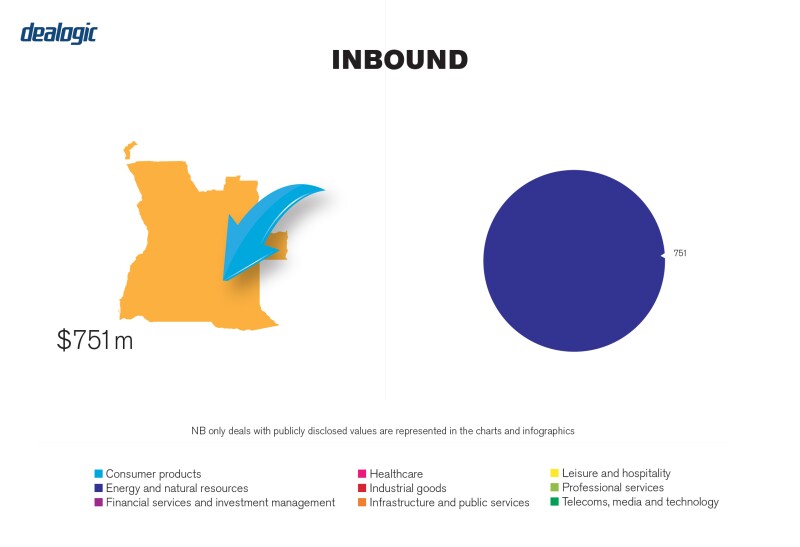In 2019 the M&A market evolved in a very favourable way, especially due to an increase in the number of transactions between private entities. This is the case notwithstanding the Government of Angola's recently launched ambitious programme of privatisation, which includes 195 companies to be privatised by 2022. Such a programme has never been seen in the country and includes companies in the oil, gas, diamond, aviation and insurance sectors, among others. The most important companies in the country are expected to be privatised.
In what concerns the private sector, the main M&A transactions were in the oil and gas sector and involved companies with interests in exploration blocks. Those were essentiality international operations.
Although in Angola there is no established, objective and accessible data tracking M&A transactions, we note that in comparison with previous years, there were slightly fewer M&A transactions, especially in the oil and gas and manufacturing sectors.
The Angolan government has taken measures to further diversify the economy and to generate more confidence for private investment in the country; the main legal measure was the enactment of new private investment law.
The M&A market is essentially controlled by private entities. However due to the abovementioned privatisation plan we expect that public entity intervention in the market will increase, particularly from the seller side.
TRANSACTION STRUCTURES
The structure of transactions is mainly influenced by the fact that there is still a predominance of state-owned companies, a fact which increases transaction risk. There are other factors such as licensing procedures, the intervention of regulatory bodies and tax and environmental issues that also influence the deal structures.
There are still economic sectors dominated by state-owned companies and privatisation will allow for a process of consolidation and a minimisation of the risks associated to private investment.
Elsewhere, the influence of financial investors has been a significant one because it has created more financing for transactions and boosted transaction volumes. We have noted a progressive increase of projects financed by international investment funds, some of them from Africa but also some from Europe, America and the Middle East. These funds present an interesting alternative to traditional financing.
The most notable recent M&A transactions in the market have raised important issues and challenges especially in what concerns competition law. As a factor for increasing credibility of the Angolan economy, the government has approved the legal regime for the protection of competition. This regime is applicable to all sectors of economic activity.
We believe that the debate on the implementation of this legal regime will most certainly affect the way M&A transactions are structured in Angola. We believe the Angolan national competition authority will have more control over M&A activity. It is important to highlight that the new legal regime is very similar to the ones in force in several European jurisdictions; therefore, investors should be familiar with the new procedures and the new requirements.
LEGISLATION AND POLICY CHANGES
The most relevant pieces of legislation for M&A are the following:
Law 1/04 of February 13 that approves the Companies Code and includes the rules applicable to each type of company;
Law 10/18 of June 26 that approves the private investment legal regime and foresees the rights, undertakings and guarantees of the investors and the benefits and incentives attributable to investors;
Law 22/15 of August 31 that approves the Securities Code;
Law 5/18 of May 10 that foresees the competition legal regime applicable to all economy sectors;
Presidential Decree 240/18 of October 12 that regulates the competition law;
Law 5/97 of June 27 on exchange operations;
Law 10/19 of May 14 that foresees the legal regime for the privatisation of state-owned companies.
These are the main legal acts, although there are other applicable ones depending of the company's activity sector.
Depending on the business area in which the targeted company operates, investors have to contact the Angolan Investment and Export Promotion Agency (APIEX), the Notary, the Companies Register, the Competition Authority and any sector-relevant regulatory authority.
The main change in the legal framework relates to the enactment of the competition law. After having identified some restrictive practices, the government decided to tackle the situation by adopting a new sanctions framework and new prior notification obligations, as well as by creating a requirement to obtain necessary permits from the competition authority in certain cases of company mergers. Not all transactions are subject to the competition law legal regime; only proposed mergers or acquisitions that exceed a certain turnover or market share threshold are subject to this regime and will need to seek approval of the competition authority.
The new private investment law should also be highlighted because it has established a set of principles and rules aimed at facilitating, promoting and accelerating investment into Angola.
Finally, considering the high number of privatisations foreseen for 2020 and the subsequent years, the decrees that will approve each privatisation and determine the particular conditions of each one are eagerly expected.

MARKET NORMS
There are sometimes misunderstandings on the part of international players due to the differences between the civil law system (Roman-Germanic family), to which the Angolan legal system belongs, and the practices of common law, typical in Anglo-Saxon countries - which is what many of the investors into Angola's M&A market are familiar with. Many of the rules and practices applicable to mergers and acquisitions and to which UK and US companies are used to are not recognised or used in Angola.
Another difficulty lies in capital repatriation and currency fluctuations. These are most often considered as a limitation to bear in mind when analysing an investment process in Angola, especially when it is to be concluded by means of M&A.
Parties to a transaction often seek legal advice at the first stages of a transaction; therefore legal support extends from the early phases of negotiation, through the negotiation phase and until deal completion. This means that lawyers and other consultants intervene in the negotiation and drafting of MoUs, NDAs, letters of intent, and different types of agreements and in the due diligence.
Technology may play an important role in M&A to speed up the efficient identification of prospective operations, in the negotiation of competitive offers and in reducing the times for analysing documents available in data rooms. Technology may also facilitate knowledge and aid evaluation and assimilation. The use of digital data rooms is very common and facilitates due diligence.
PUBLIC M&A
According to Angolan law some M&A transactions are subject to the approval by authorities. These include regulated investment activities such as banking and finance, oil, gas and mining.
Furthermore, labour unions also play an important role in M&A transactions because the law stipulates that they must be consulted whenever a transaction may lead to any change from the employees' perspective.
Public takeover offers are subject to the legal regime foreseen in the Securities Code (Law no. 22/15 of August 31 that determines the equal treatment of the offer targets with some exceptions foreseen by the law). This legal regime imposes the prior registration for the Offer with the Organismo de Supervisão do Mercado de Valores Imobiliários (Securities Market Supervision Entity). The registration request requires that several documents are filed.
The law also imposes mandatory intermediation by an intermediation agent in cases where a prospectus is requited and a non-disclosure obligation until the preliminary announcement is publicly disclosed. This non-disclosure obligation is imposed on every party involved including the offeror, the targeted company, their shareholder, employees and service providers, among others.
The break fees concept is not applicable in the Angolan law.
PRIVATE M&A
Parties to a private M&A transaction have full autonomy in regard to consideration mechanisms. Price and payment terms are issues usually subject to thorough negotiation between the parties. It is not uncommon to find M&A deals in which there are fixed price mechanisms, variable price mechanisms and even a combination of both. The financial system also makes available several tools, such as escrow accounts and bank deposits and guaranties to facilitate the completion of deals.
Private offers do not have to obey to pre-established rules or to a standard structure. Therefore, parties are free to negotiate conditions, with the exception the following:
Private offers made by listed companies that have the obligation of reporting those operations to the Organismo de supervisão do Mercado de Valores Mobiliários for statistical purposes;
The private offers in which there is no need of distribution of a prospectus must mandatorily be notified to the Organismo de supervisão do Mercado de Valores Mobiliários.
Apart from these restrictions foreseen in the Securities Code, other restrictions may arise from the Articles of Association of the targeted companies – for example these can foresee the existence of different types of shares with different voting rights.
The Angolan legal regime belongs to the Roman–Germanic family – the civil law system. However, it is common to see M&A in which the laws from other jurisdictions used, namely common law regimes particularly those of the UK and USA. It is also frequent to have jurisdiction clauses choosing arbitration procedures governed by the laws of other countries or also by the UNCITRAL regulations.
W&I insurance is not common in private M&A transactions in Angola.
As for the exit environment, sales are usually made to strategic purchasers and/or commercial partners. This is the most common exit strategy in Angola.
LOOKING AHEAD
At the beginning of 2020 there was a big M&A transaction in which Sonangol increased its shareholding in Unitel. This transaction was concluded through the purchase of 25% of the Brazilian telecoms company Oi, which owns PT Ventures.
The market is forecasting a substantial increase in M&A transactions in 2020, especially due to the privatisation programme which aims to privatise 195 companies by 2022. This programme represents a move towards a market opening and liberalisation of the Angolan economy never seen before. It could lead to important transactions requiring an increasing recourse to lawyers and other consultants' services.
The sectors included in the programme are mainly the banking and insurance, real estate, gas, air or sea transportation services, agriculture, diamonds, oil and hospitality sectors.
About the author |
||

|
|
Nelson Raposo Bernardo Managing partner, Raposo Bernardo Lisbon, Portugal T: + 351 21 3121330 E: nrbernardo@raposobernardo.com Nelson Raposo Bernardo is the managing partner and head of the banking and projects practices. Nelson has more than 25 years of international experience in high-profile and complex operations and has been involved in multiple transactions in Portugal and abroad. He focuses on M&A, banking and finance, capital markets, project finance and private equity, as well corporate restructuring and corporate finance. Some of his recent transactions include advising BNP Paribas on an Aircraft Portfolio Financing; Helios Investment Partners in the acquisition of Fertilizers and Inputs Holding, held by Louis Dreyfus; Mitsubishi Corporation Bank on international credit operations; Japan Bank for International Cooperation in operations regarding export loan agréments; Rabobank for financing operations of Ferry Boats; General Electric for a power wind farm project; and Barclays Bank and Caixa Bank in a banking syndicate with another 15 banks for the refinancing of an internation al construction group. |
About the author |
||

|
|
Ana Cláudia Rangel Senior associate, Raposo Bernardo Lisbon, Portugal T: + 351 21 3121330 E: acrangel@raposobernardo.com Ana Cláudia Rangel has over 20 years of experience in important corporate transactions, complex commercial litigation and international arbitration. She focuses her activities in Portugal and in Lusophone jurisdictions. Claudia's recent transactions include advising on the acquisition of Pipeline Induction Heat (PIH) by Stanley Black & Decker, which aims to consolidate a leading role in the oil & gas sector; China Construction Bank on a facility loan agreement for an international credit transaction; AXA Insurance on specialised maritime and cargo litigation actions; Black Star Petroleum on a change of concession control operation for oil blocks; China Development Bank in an arbitration on RMB credit infrastructure project loan and pledge agreement; Nomura Bank on operations of capital equipment finance involving finance leases; and Africa Oil Corporation on the acquisition of upstream assets. |



